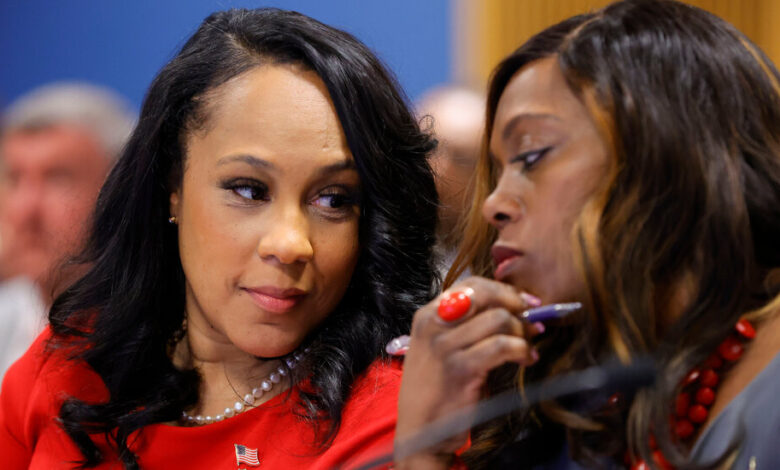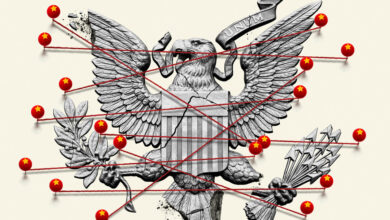Trump Lawyer Urges Judge to Disqualify Fani Willis in Georgia Case

A judge in the Georgia election interference case against former President Donald J. Trump heard final arguments on Friday on a motion to disqualify the prosecutor who brought the case, Fani T. Willis, on the ground that a romantic relationship she had with a subordinate created a conflict of interest.
In a recurring line of attack on Friday, defense attorneys tried to set the bar low for disqualification, arguing that even the appearance of a conflict of interest could lead to the dismissal of Ms. Willis and her entire office from the case. The question could be pivotal to the outcome of whether the disqualification effort succeeds.
“We can demonstrate an appearance of a conflict of interest and that is sufficient,” John B. Merchant III, a lawyer for one of Mr. Trump’s co-defendants, Michael Roman, told the judge, Scott McAfee of Fulton County Superior Court.
Mr. Trump’s lawyer, Steven H. Sadow, picked up the theme in his own remarks, arguing that “once you have the appearance of impropriety,” the law in Georgia is clear: “That’s enough to disqualify.”
Mr. Sadow also told the judge that comments Ms. Willis made in January at a Black church in Atlanta were a “violation of professional rules of conduct.” Her speech, at the Big Bethel African Methodist Episcopal Church in January, came shortly after the conflict-of-interest motion was filed.
Ms. Willis, who is Black, suggested in the speech that the scrutiny of her romantic relationship with the prosecutor she hired to run the Trump case, Nathan Wade, was racist. Some of those comments she described as part of a conversation she had with God.
“It was a calculated determination by Ms. Willis to prejudice the defendants and their counsel,” Mr. Sadow said, adding, “Can you think of anything more that would heighten public condemnation of the defendant than alleging that the defense counsel and the defendants were making their motion based on race and religion? That’s as bad as it gets in Fulton County, with all due respect.”
With Ms. Willis seated at the prosecution table, Adam Abbate, a lawyer from her office, said that appearance alone was not enough to disqualify her and that an underlying conflict of interest had to be established, according to Georgia law and legal precedent.
“The defense has to show an actual conflict,” Mr. Abbate said, adding that it had not done so in this case.
After Mr. Abbate sought to bolster his argument by citing a number of prior cases in which a conflict of interest had been found, Judge McAfee interjected that “a number of these cases seem to rely on appearance of impropriety.” But Mr. Abbate portrayed issues of appearance as secondary, and said that in each of the prior cases of disqualification that he cited, “the court found an actual conflict.”
He called the defense’s effort to disqualify Ms. Willis “a desperate attempt to remove a prosecutor from a case for absolutely no reason, other than harassment and embarrassment.”
During the hearing, Ms. Willis and her office were assailed by a series of veteran defense lawyers who seemed quite at ease, while Mr. Abbate had a more halting, and at times fumbling style, relying more on his recitation of precedent and case law. But it was not clear whether the discrepancy will impact Judge McAfee, who will be more interested in the substance of the legal questions, rather than the delivery style.
Judge McAfee said Friday that he would rule within two weeks. The hearing Friday allowed lawyers from the two sides to sum up their arguments over a salacious subplot to the election case — one that has already caused significant embarrassment and turmoil for Ms. Willis, the Fulton County district attorney. Details of her personal life have been spilled out in the Atlanta courthouse where she had hoped to put Mr. Trump and 14 co-defendants on trial as soon as this summer.
The stakes are high: If Ms. Willis is disqualified from the case, her entire office would be, too, and the case would probably be turned over to a district attorney from another jurisdiction. The new prosecutor could choose to continue the case as planned, modify the charges or drop them.
Disqualification would reduce the chances that a trial would begin before the November presidential election, in which Mr. Trump is expected to be the Republican nominee.
The relationship between Ms. Willis and Mr. Wade, an Atlanta-area lawyer she hired in November 2021 to manage the prosecution team, first came to light in January, in a motion filed by Ashleigh Merchant, a lawyer for one of Mr. Trump’s co-defendants.
Ms. Merchant, who represents Mr. Roman along with her husband, John Merchant, asserted that the romance began before Ms. Willis hired Mr. Wade, and argued that Mr. Wade was unqualified for the high-profile job, for which he has been paid at least $650,000 so far.
Ms. Merchant also claimed that Mr. Wade and Ms. Willis had engaged in “self-dealing,” because the couple went on vacations together that she said Mr. Wade had paid for.
In her filing on Jan. 8, Ms. Merchant cited Georgia case law in arguing that the situation as she laid it out met the standard for a disqualifying conflict of interest.
On Friday, Mr. Merchant told the judge that “we have here a very personal financial interest that’s been laid out in terms of money received by Ms. Willis, as a result of the scheme that she set up.”
Ms. Willis and Mr. Wade have acknowledged that they had a romantic relationship. But they have said that it began after Mr. Wade was hired, and that it ended before Mr. Trump and 18 of his allies were charged in August in a sweeping indictment that accuses them of conspiring to overturn Mr. Trump’s defeat in the 2020 election. Ms. Willis said the couple roughly split the costs of the trips they took together, with Ms. Willis often using cash to pay back Mr. Wade for her share.
In a later legal filing, Ms. Willis brushed aside the motion to disqualify her as a legally dubious stunt, arguing that there was no conflict of interest. She wrote that “the existence of a relationship between members of a prosecution team, in and of itself, is simply not a status that entitles a criminal defendant any remedy.”
The judge held a series of hearings on the issue in February that felt at times like a mini-trial. Mr. Wade took the stand, as did Ms. Willis, who pushed back angrily against Ms. Merchant’s questions. Ms. Willis described feeling loneliness after becoming the district attorney, the violent threats and racist messages she had received, and her frustration that the focus on her love life had distracted the nation’s attention from Mr. Trump and the 14 co-defendants who remain after four of those originally charged pleaded guilty.
At a hearing on Tuesday, the conflicting accounts of when the prosecutors’ romance began took center stage. Ms. Merchant called Terrence Bradley, a former law partner of Mr. Wade, to the stand, hoping to help prove that the relationship began before Mr. Wade was hired.
But Mr. Bradley delivered contradictory information. Entered into evidence was a text exchange he had with Ms. Merchant months earlier, in which he said that the relationship “absolutely” predated Mr. Wade’s hiring. But on the witness stand, he repeatedly said he had no knowledge of when the romance began.
The judge will have to decide which of Mr. Bradley’s accounts to believe as he weighs whether to disqualify the prosecutors.
At Friday’s hearing, Mr. Sadow said Mr. Bradley’s text messages showed that the relationship began before Mr. Wade’s hiring. But the judge seemed uncertain.
“Is it ever definitively shown how he knew this and that he actually did know it?” Judge McAfee asked during the proceedings. “Other than just an assertion outright? ‘Absolutely.’ Usually if a state has a witness that goes sideways, they’ve got him locked in. They’ve sat down with a detective and got a full statement. We don’t have that here.”
Another witness, a former friend and employee of Ms. Willis named Robin Yeartie, also testified that the relationship predated Mr. Wade’s hiring. But under cross-examination, she said that she had left the D.A.’s office on bad terms and was no longer Ms. Willis’s friend.
Mr. Abbate on Friday dismissed both Mr. Bradley and Ms. Yeartie as people who had an ax to grind with the prosecutors.
There is already some precedent within the Trump case for disqualification. In July 2022, a judge blocked Ms. Willis from developing a case against Burt Jones, a fake Trump elector in Georgia in 2020, because Ms. Willis had hosted a fund-raiser for one of Mr. Jones’s political rivals. A year and a half after the disqualification, no replacement prosecutor has yet been named to continue investigating Mr. Jones, who is now Georgia’s lieutenant governor.
Pete Skandalakis, the executive director of the Prosecuting Attorneys’ Council of Georgia, said in a recent interview that the current situation was different from the one involving Mr. Jones and suggested that it could move more quickly because an indictment has already been handed up.
Mr. Skandalakis, who would be the person responsible for reassigning the case, said last month that only a few other district attorney’s offices in Georgia were large enough to handle the case, and that one factor he would consider if he had to reassign the case would be a district attorney’s proximity to Fulton County. That probably means that the case would fall to a district attorney’s office in the Atlanta region.
Such an outcome would inevitably delay the case for some time.




